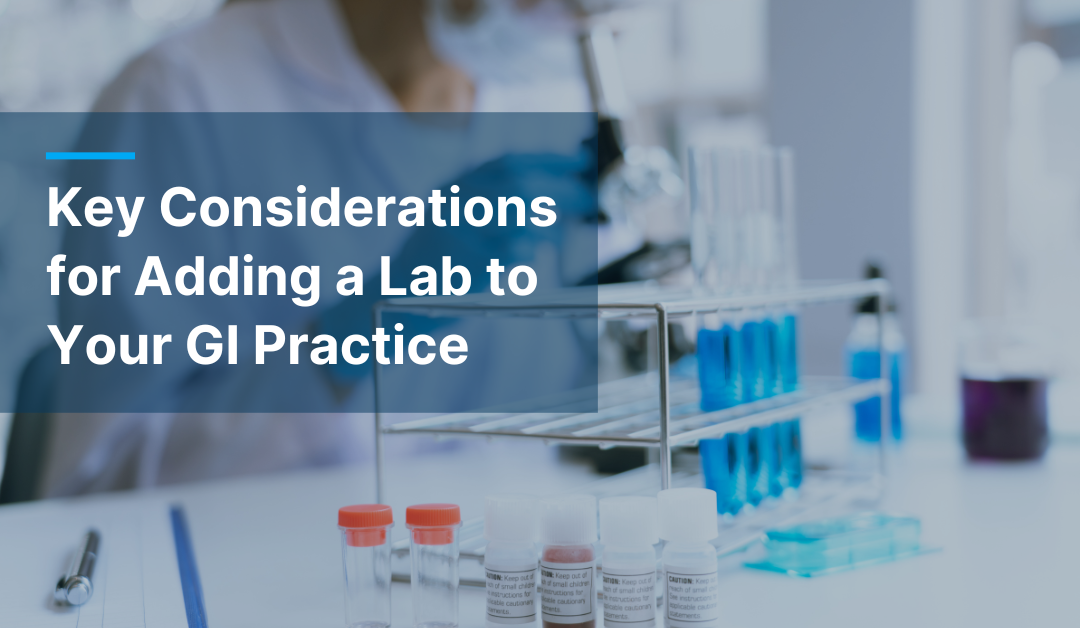Building a laboratory within a gastroenterology (GI)practice can be a strategic move to boost control over your samples and improve your standing with private payers, providing physicians with opportunities for increased efficiency and revenue. In this guide, we’ll explore key points to consider when adding a lab to a GI practice, focusing on when it makes sense for a practice to consider adding its own in-house laboratory.
Incorporating a laboratory into a gastroenterology practice is not just about expanding services; it’s a strategic decision that can significantly enhance your practice’s efficiency, diagnostic accuracy, and financial health. Careful consideration of the volume of specimens, understanding the insurance payer landscape, and preparing for the necessary infrastructure are essential steps in determining whether this move could be beneficial to your practice and patient population.
What Options Do GI Physicians Have When Building a Lab?
Within the realm of GI labs (and most pathology labs in general), two primary billing categories exist: Professional Component (PC) and Technical Component (TC). While TC covers the billable portion of any equipment or instrumentation used to perform a service, PC refers to a physician’s knowledge and expertise when determining a diagnosis or reading a slide. These two components combine to create what’s referred to as a Global procedure, which encapsulates both the technical and professional components of a service.

Rod Glose, Director of Pathology Consulting, LLS
PC-only labs can be a cost-effective option initially, requiring minimal setup with a pathologist and a microscope, says Rod Glose, Director of Pathology Consulting for Lighthouse Lab Services.
“A significant portion of GI groups opt for PC-only labs initially,” Glose says. “These labs may have the volume to justify a full global lab but are sometimes cautious of staffing and logistical challenges, in addition to potential reimbursement hurdles.”
By making a modest investment in a PC lab, these physicians can take time to determine whether expanding to a full Global lab makes sense for the sample volume they are processing and the payers they are billing.
- RELATED ARTICLE: What Does It Cost to Start an In-House Pathology Lab?
3 Primary Considerations for GI and Endoscopy Providers Without Labs
When a GI physician expresses interest in adding in-house testing, there are three primary considerations they should consider.
- First, assessing the volume of specimens generated from endoscopy procedures is crucial. A global lab typically requires a minimum volume of 4,000 specimens (or “jars”) per year, while a PC-only lab may start at around 1,500 specimens, according to Glose.
- Second, understanding the insurance payers and identifying any that won’t reimburse for pathology services is essential for the financial viability of a lab. This is another benefit of starting a PC-only lab prior to establishing a full Global lab, since a physician will be able to gauge how payers respond to his/her claims without a significant upfront investment into their in-house lab.
- Third, a physician must ensure he/she has the right to send specimens to a lab of their choice, especially if procedures are conducted in their endoscopy center.
“Some GI physicians might actually perform their procedures in a hospital, and the hospital may have rights based on their legal agreements to send those specimens to the hospital lab,” Glose notes. “That’s definitely something to look into first.”
Infrastructure and Costs for Global and PC-Only Labs
Keep in mind that building a Global lab will involve additional infrastructure, including 350-500 square feet of space, specific electrical and HVAC requirements, plumbing, and equipment costing between $75,000 and $200,000. Construction costs can range from $150,000 to $200,000, and complexity increases due to safety regulations related to flammable substances used in histology labs.
Again, the comparatively low barrier to entry is why some physicians will first explore establishing a PC-only lab, which requires much less space and equipment. For example, Glose estimates most PC-only labs will run a GI physician about $10,000 to $15,000 in upfront costs, with roughly $10,000 in ongoing operational expenses. These recurring costs include items such as CLIA application fees, malpractice insurance, and microscope maintenance.
You’ll also want to budget for the salary of your pathologist, if needed, and any recruiting costs necessary to locate a qualified individual.
Common Oversights
Some GI physicians may overlook or be misled about the true costs of setting up a lab, often influenced by unrealistic promises from local equipment sellers. Emphasizing the importance of investing in quality construction, design, and expertise for a lab is crucial to ensure compliance with safety standards and regulations.
“Just be mindful that if something sounds too good to be true, it probably is,” Glose cautions. “You want to work with a holistic expert who understands every aspect from construction to reimbursement, not someone who will simply sell you some equipment and disappear.”
You’ll also want to be cautious about anyone who guarantees fantastic reimbursements for a specific test or service before you’ve experienced how payers in your network will respond to your billing claims. While some tests may have strong reimbursement rates, payments could also be impacted by hurdles such as Local Coverage Determinations (LCDs), billing edits, and payer utilization policies. This is why it’s imperative to conduct a billing analysis or audit shortly after you begin offering a new service.
Next Steps
By taking a well-informed approach, GI physicians can navigate through the complexities of setting up an in-house laboratory, avoiding common pitfalls, and aligning their practice’s goals with achievable, sustainable growth. The integration of a laboratory is not just an addition of a service; it represents a forward-thinking leap into providing comprehensive, patient-centered care, reinforcing your practice’s reputation in the medical community.
Our team at Lighthouse Lab Services understands the intricacies of this process and is committed to guiding you every step of the way. Whether it’s making the initial decision, planning the setup, or navigating regulatory requirements, our expertise is at your disposal. By partnering with us, you ensure that your journey towards integrating a laboratory into your practice is smooth, well-informed, and aligned with your vision of providing the highest standard of care in gastroenterology.
Are you ready to explore the possibilities and benefits of adding a laboratory to your GI practice? Contact us for a free consultation to explore ways to enhance your practice’s capabilities and enrich your patients’ healthcare experience.
